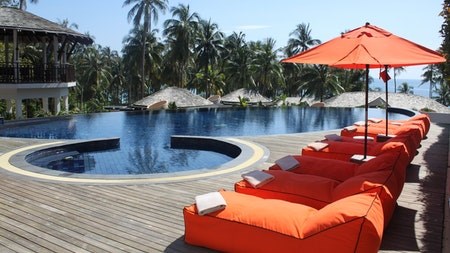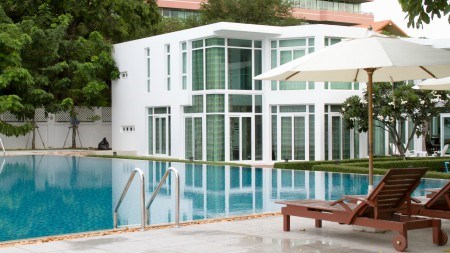Natural pools consist of two zones - a swimming zone, similar to a conventional pool, and a regeneration zone which is like a wetland in nature and acts as the filter for the pool.
The aquatic plants in the regeneration zone clean the water by consuming contaminants and harmful bacteria. This eliminates the need for adding chemicals, and you don’t ever have to check chlorine, acidity and alkalinity levels or backwash the system.
Pumps keep the water circulating, UV filters or bio-filters remove additional undesirable organisms, and skimmers can get rid of floating debris.
The regeneration zone can be created inside the swimming pool so that both zones form a single body of water. Alternatively, it can be set up in an adjacent pond - or even on the other side of the garden - with the water flowing back into the pool.
A natural swimming pool can be designed to look like a mountain pool, a pond or very much like a modern conventional pool – whichever you prefer.
Advantages
Natural swimming pools positively impact the environment, and the beauty and tranquillity of a water garden bring a new dimension to the urban landscape.
- They are a haven for wildlife and attract many species of birds, insects, amphibians and other small animals to your garden.
- The health benefits are enormous, as no chemicals are needed to keep the water clean and safe for bathing.
- Natural swimming pools are self-cleaning and require very little maintenance.
- They also cost far less to operate than a conventional pool using chemicals. In addition, low energy submersible pumps are suitable for the day-to-day running of the pool, and these can run off solar power.
- The water can be used to drink or for watering the garden if needed.
Energy
A natural pool uses less than half the energy needed for a conventional pool. This is because natural pools can use more efficient submersible pumps, as the water flow requirement differs from conventional swimming pools.
A chlorinated pool needs a high-pressure pump that can force water through a sand filter. However, moving water through a wetland doesn’t require high pressure. So even though the pump for a natural pool needs to run continuously - compared to six hours for a conventional pool - it still consumes less than half as much energy each month.
A conventional pool: 6 hrs x 750 W = 4 500 W/day = 135 kWh/month
A natural pool: 24 hrs x 90 W = 2 160 W/day = 64.8 kWh/month
Design
An important design feature is to minimise maintenance, including a pre-filtration area that traps sediment and prevents the wetland from silting up too quickly. This will help you avoid the task of having to dig up, wash and replant the aquatic plants in the regeneration zone.
The system should have water pipes under the plants and a hatch for accessing the roots, which sometimes need to be cut away to keep the water flowing freely.
Maintenance
Although the level of maintenance is less than that of a conventional chlorinated pool, natural pools still require some maintenance.
Tasks to carry out periodically:
Weekly - empty out the skimmer.
Monthly - clean and vacuum the floor surface of the swimming zone.
Once a year - clean out the pre-filter sponges.
Once a year - prune the plants.
Adding value
More and more buyers are looking for properties with sustainable, environmentally-friendly solutions. Including features such as a natural swimming pool is bound to increase your property’s appeal.


